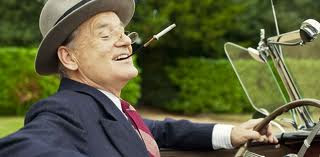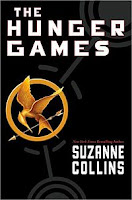
The film is Hyde Park on the Hudson, directed by Roger Michell (
Notting Hill, Changing Lanes, Venus) and written newcomer Richard Nelson.
Franklin D. RooseveltFranklin D. Roosevelt was born January 30, 1882 in Hyde Park, New York to a wealthy family. Roosevelt is said to have been raised more by his mother than his father. He took regular trips to Europe and picked up some German and French. He was an avid sportsman, including golf and sailing.
Franklin D. Roosevelt attended Harvard, and while there is fifth cousin Theodore Roosevelt became president (1902). It was also in that year he reacquainted with Eleanor Roosevelt at a White House Reception. Eleanor was Theodore's niece. Eleanor was Franklin's fifth cousin once removed.
Roosevelt graduated from Harvard in 1903, entered Columbia Law School in 1904, married Eleanor in 1905.
Before getting his juris doctorate at Columbia, Franklin Roosevelt dropped out having passed the Bar Exam and took a job with the Wall Street firm Carter Ledyard & Milburn.
Franklin Roosevelt and Eleanor Roosevelt had six children (although much has been said about Eleanor's aversion to sexual intercourse). Anna was born in 1906, James in 1907, Franklin Delano, Jr in 1909 [who died in his first year of life], Elliot in 1910, a second Franklin Delano, Jr. in 1914, and John in 1916.
In 1910, Franklin D. Roosevelt ran for New York State Senate from the Hyde Park district around Duchess County, which he won, taking his seat January 1, 1911. He resigned in March of 1913 when Woodrow Wilson appointed Roosevelt Assistant Secretary of the Navy, under Josephus Daniels. Roosevelt became a strong supporter of the Navy with proposals that often exceeded the interest of United States foreign policy in aggressive action.
During this time, Franklin Roosevelt began what is believed to be his first and most notorious affair with Lucy Mercer, who was hired in 1914 to be Eleanor's social secretary. Eleanor would find out about this affair in 1918 upon finding letters in Roosevelt's luggage. Eleanor is reported to have offered Roosevelt a diverse to be with Lucy Mercer, but Lucy refused marriage to a man with five children, and Franklin's mother Sara aggressively discouraged the divorce due to the shame it would bring on the family. Instead Roosevelt committed not to see Lucy Mercer any more, and a wedge was driven into the relationship with Eleanor and Franklin, that lead to Eleanor spending the remainder of their marriage primarily living in a separate house in Hyde Park at Val-Kill.
But this was not his only affair. He is also said to have had a 20-year affair with his private secretary Marguerite "Missy" LeHand (shared by his son Elliot in the 1973 book
An Untold Story: The Roosevelts of Hyde Park). LeHand died in 1941 associated with a general decline in health and a stroke. Many attribute this decline in health to Roosevelt replacing LeHand's companionship with Princess Martha of Norway.
In 1919 the Newport Sex Scandal broke - a case that was reported on daily in the papers in which a subculture of homosexual acts and cross dressing associated with the Army and Navy YMCA broke out, and in addition to the press associated with the deeds themselves, the investigation would gain criticism for the way it's investigators used an infiltration approach that often led them to commit acts it was reporting on.
Roosevelt as assistant secretary of the Navy resigned at this time and became the Vice Presidential running mate of James Cox in 1920 presidential election. Warren G. Harding, the republican candidate won the election, and became president. After the election, Roosevelt returned to New York to practice law again.
In August of 1921 Roosevelt fell into the Bay of Fundy while boating, while everything seemed normal for the next day, he suddenly had a numb leg, that would over the days ahead lead to paralysis of his lower body and a diagnosis of poliomyelitis two months after he fell ill. His paralysis would characterize the rest of his life. In 2003 peer-review study, modern researchers suggested that Roosevelt may have actually had Guillain–Barré syndrome, a paralysis that begins at the feet and hands and migrates towards the trunk.
Roosevelt would be careful from this point forward to present himself as getting better. He was only twice photographed in his wheelchair, avoiding to use in any public place. He also taught himself to walk by using iron braces and his hips.
After working through the 1920s to assist Alfred E. Smith, maintain the position as elected democratic governor of New York, when Smith ran for president 1928 he requested Roosevelt run as his replacement in the gubernatorial elections. Roosevelt accepted the invitation and became the governor of New York in 1928. He ran for a second term in 1930, which he won.
By 1932 he was running for president as the democratic representative. He won in a time when Herbert Hoover was incredibly vulnerable due to a struggling economy in the first years of The Great Depression.
Roosevelt's first terms as president were characterized by the great depression, and what Roosevelt termed The New Deal, which led to an onslaught of new government program, including new regulative agencies and stabilization programs.
Roosevelt won his second term as president against republican candidate Alf Landon, and far less legislation was passed in this second term, with conflict within the Supreme Court over Roosevelt's Nation Recovery Act, and Roosevelt's attempt to pack the court with 6 new justices, although that attempt failed. Roosevelt also maintained a general neutrality to world affairs that he had begun under President Wilson and in the previous term by dismantling military involvement and weapon sales in Latin America.
By the time World War II broke out, Roosevelt did break with Wilson's neutrality pack and did attempt to assist Britain and France, including secret correspondence with Winston Churchill as well as supporting a break in the embargoes associated with Europe. In 1940 he made the famous quote that America should be the arsenal of democracy, attempting to create interest in intervention.
In the election of 1940 Roosevelt made a unique power grab to maintain the presidency by moving the convention to Chicago, and creating a scene that showed willingness for the convention to choose anyone, but uniquely positioning himself as a popular choice, despite the unwritten rule that presidents would only serve two terms.
Roosevelt won a third term against Republican Wendall Wilkie, and his third term was defined by WWII, which initially was involved with all efforts to assist in the fight against Nazi Germany without declaring war, but the landscape changed December 7, 1941 when Pearl Harbor was attacked. The United States involvement in the war was significantly important to the war, the changing world power structures as well as the United States economy.
It was also during this time that the affair with Lucy Mercer appears in historical records to have resumed despite Franklin's promise to stop communication with her. Including reuniting in 1941 and being with Franklin even on the day of his death. She also had the code name "Mrs. Johnson" that was used by the secret service.
Roosevelt experienced declining health in 1944, but still ran for president, with a new vice president Harry S Truman. They narrowly won against Thomas E. Dewey.
On March 29, 1945 after continued conferences aimed at strengthening world alliances and the United Nations, FDR died at the age of 63 in Warm Springs, Georgia with a cerebral hemorrhage. Roosevelt would be buried on April 14, 1945 in the rose garden of his families estate in Hyde Park.
Hyde Park on the HudsonThe story of Hyde Park on the Hudson takes place in 1939, and deals with an affair that Roosevelt had with a distant cousin Margaret Suckley over a weekend that the King and Queen of the United Kingdom visit New York.
In addition to Bill Murray playing the part President Franklin D. Roosevelt in the end of his second term, Olivia Williams plays his wife Eleanor, and Laura Linney plays his cousin Margaret Suckley.
Olivia Coleman plays Queen Elizabeth and Samuel West plays
King George VI.
Bill Murray's only Oscar nomination was for his role in Lost in Translation (2004), but a portrayal of FDR is sure to give Murray a chance to top-line on some awards list. Will Murray receive his second Oscar nomination for portraying this Real (Reel) Person?
 Today, my 13 month old son, Shepherd, is sitting on my shoulders when we take a walk and he's humming/singing/mumbling.
Today, my 13 month old son, Shepherd, is sitting on my shoulders when we take a walk and he's humming/singing/mumbling.











